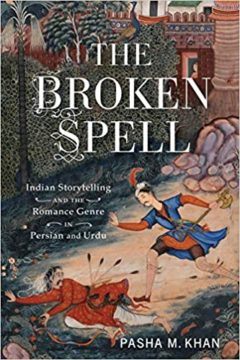Aqsa Ijaz at Marginalia Review:
 A whole way of seeing and representing the world has faded with the loss of such forms of storytelling. And its absence is felt by those who study the past through the cracks of those stories, which were neither histories nor fictions but a unique perspective on reality that used both these modes of comprehension. As Stewart, in his book on the premodern Bengali storytelling tradition, Witness to Marvels: Sufism and Literary Imagination (2019), suggests, narratives are never subject to the test of truthfulness precisely because they are literary. It is different from saying that they are false because they are fiction. They don’t operate on the principle of having a truth-claim but possess a truth-value, giving way to a different kind of contract between the listener and the storyteller. Such an engagement illuminates the function of these narratives rather than the mere verifiability of their content. As Khan tells us in his book, The Broken Spell: Indian Storytelling and the Romance Genre in Persian and Urdu (2019), the storytellers in premodern North India were crucial to the social fabric. By telling age-old stories with new twists and turns that were instructed and provided models of emulation for an ethical life and good conduct, they kept the past contemporaneous with the present.
A whole way of seeing and representing the world has faded with the loss of such forms of storytelling. And its absence is felt by those who study the past through the cracks of those stories, which were neither histories nor fictions but a unique perspective on reality that used both these modes of comprehension. As Stewart, in his book on the premodern Bengali storytelling tradition, Witness to Marvels: Sufism and Literary Imagination (2019), suggests, narratives are never subject to the test of truthfulness precisely because they are literary. It is different from saying that they are false because they are fiction. They don’t operate on the principle of having a truth-claim but possess a truth-value, giving way to a different kind of contract between the listener and the storyteller. Such an engagement illuminates the function of these narratives rather than the mere verifiability of their content. As Khan tells us in his book, The Broken Spell: Indian Storytelling and the Romance Genre in Persian and Urdu (2019), the storytellers in premodern North India were crucial to the social fabric. By telling age-old stories with new twists and turns that were instructed and provided models of emulation for an ethical life and good conduct, they kept the past contemporaneous with the present.
more here.
